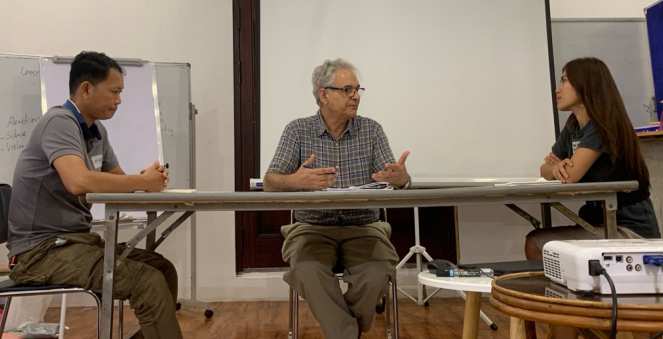In a world where conflicts dominate headlines, historical approaches to peace building, while well-intentioned, are often ineffective, focusing on the absence of violence and neglecting the deeper roots of conflict.
In Cambodia, the Women Peace Makers (WPM) are testing an alternative approach, in collaboration with the Institute for Economics & Peace (IEP). WPM organised the Seeds of Peace (SoP) program, using IEP’s Positive Peace framework to move past the narrow view of peacebuilding. Drawing example from Cambodia’s own devastating historical experiences, attendees from various ethnic backgrounds were drawn to the program by one common goal. Peace.
The program, held between April and May, aimed to equip participants with comprehensive knowledge and practical skills in conflict resolution, nonviolent communication and leadership. Through workshops, lectures and case studies, distinguished trainers Patricia Garcia, Abe Quadan, Suyheang Kry and Rattanak Ly inspired community members to transform Cambodia’s attitudes, structures, and institutions in support of Positive Peace.

For Sokmeng Leang, it was exactly what she was looking for. “It was a safe space for me to learn and raise new ideas … I still believe that in every disaster there is hope” she says.
Suyheang Kry, Executive Director of WPM, said the core of the program “is to plant more seeds of peace and provide them with connections and an ongoing support system of like-minded peer groups as they move forward on this difficult but possible peace journey.”
With lively discussions and group activities, the seeds of peace began to grow.
Participants remarked that the training made them feel more confident in their peacebuilding skills. Um Sorachna, a fourth-year student majoring in International Relations at the University of Cambodia, knows the skills she learned are essential.
“Personally, I have started applying it in my current job as a facilitator in training youth on peace building and conflict transformation,” she said.
Lav Bunrithy recognises that if Cambodians want to see the change they want, they must move towards Positive Peace. For him, the mediation practice proved the most useful, learning about various techniques, from negotiation and dialogue facilitation to problem-solving approaches. Participants plan to use their newly developed skills to run similar community-building trainings with individuals from different provinces and ethnic groups in Cambodia.

The program’s international nature – its greatest strength – supports two essential components of effective mediation: understanding and collaboration. Participants entered the training with their unique perspectives, ideas and challenges and left with a diverse global network of peace builders.
The impact of the Seeds of Peace will live on past its completion. The training program stands as a testament to the power of education and collaboration in global peace building efforts. As participants return home, they embody the spirit of resilience and reconciliation that defines Cambodia, spreading hope and understanding across borders.
IEP and Women PeaceMakers acknowledge the generous support of the Emalyn Foundation to the Seeds of Peace Training on Peace Leadership.